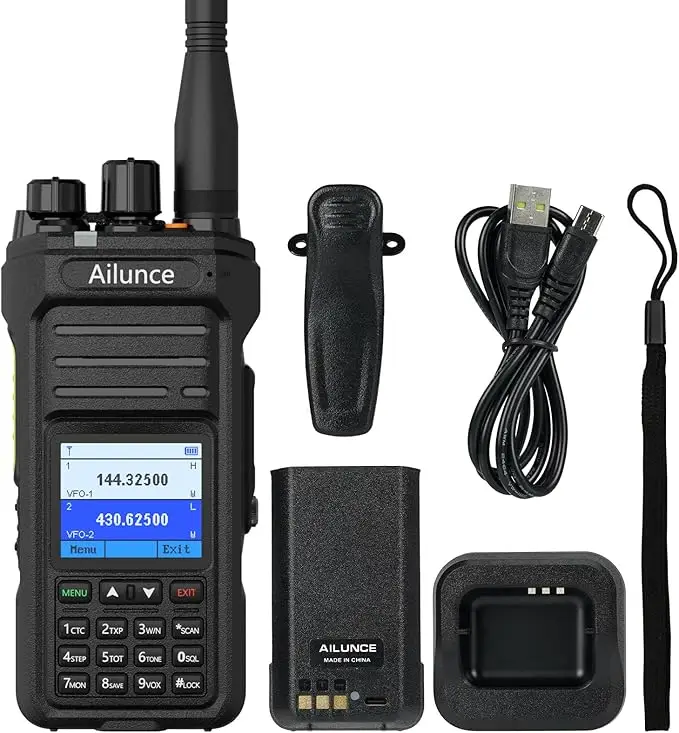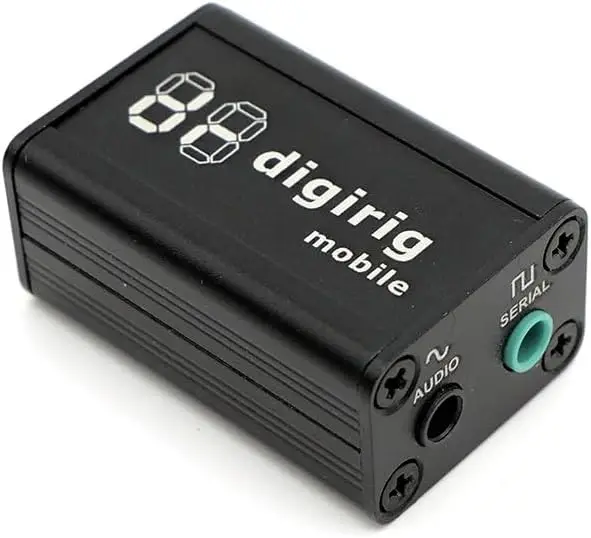The TIDRadio TD-H3 has emerged as a compelling alternative in the crowded budget handheld radio market, positioning itself as a more modern successor to the ubiquitous Baofeng UV-5R series. With features like USB-C charging, Bluetooth programming, and a color display, this compact dual-band radio promises to address many of the pain points that have plagued budget handhelds for years.
No products found.
Affiliate Disclosure:
“Just so you know, some of the links on this page are affiliate links. This means if you decide to make a purchase through one of those links, I might earn a small commission at no extra cost to you. Your support helps keep this content going—thank you!”
Bottom Line Up Front
The TD-H3 delivers impressive value at around $32, offering modern connectivity features and solid performance that rivals radios costing significantly more. While it has some quirks and quality control issues typical of budget Chinese radios, its innovative features and compact size make it a standout choice for both newcomers and experienced operators looking for a capable backup radio.
Company Background and Market Position
TIDRadio has been in the radio business since 2013, though the TD-H3 represents one of their most ambitious attempts to modernize the budget handheld radio experience. The company has shown a willingness to listen to customer feedback and address problems—a refreshing approach in the budget radio market where many manufacturers seem content to ignore user complaints.
This radio follows a trend that many have noticed: “The consumer wants a radio that can do it all despite any FCC rules or regulations stating otherwise. The buying public seems to want radios that can be unlocked to do much more than they are certified to do.”
Physical Design and Build Quality
Size and Ergonomics
The TD-H3 is described as “TINY” compared to other handhelds, similar in size to the old Yaesu VX-3 but more narrow. The radio is “slightly smaller than average, being narrower and thicker than most” with some users finding it “nice and comfortable to hold, just too narrow to really get a grip on.”
This compact form factor is both a strength and a weakness. Users report “it’s so small, that it’s a radio that I literally carry everywhere” and “fits in your average pants pocket.” However, the buttons are “pretty small making them a little difficult to press in some situations (such as quickly at a stop light).”
Construction Quality
The build quality appears solid for a budget radio. Both TD-H3 models are described as “small but solidly built handhelds.” The radio features rounded corners and a curved back on the belt clip that users appreciate. The battery attachment mechanism receives particular praise, with one reviewer noting it “comes on and off quickly and easily but is held on extremely well.”
Technical Specifications and Performance
Frequency Coverage
The TD-H3 is marketed as a multi-band radio, though it’s essentially a dual-band transceiver with extensive receive capabilities:
Transmit:
VHF: 136-174MHz Tx/Rx
UHF: 400-470MHz Tx/Rx
Receive Only:
AM: 108-136MHz Rx; FM: 50-76MHz Rx, 76-108MHz Rx; VHF: 174-350MHz Rx, 350-400MHz Rx; UHF: 470-600MHz Rx
Power Output and Performance
The radio outputs 5W of power and includes 199 channels with features like VOX, dual frequency/dual standby, scan functions, and DTMF lock capabilities.
Performance testing reveals mixed results. One comprehensive review noted: “I can’t find much not to like about this radio, including the fact that according to my tests, it seems to comply with FCC specs for spurious emissions, which surprised me in a very positive way.” Spectrum analysis shows “output is pretty smooth and concentrated pretty much right where it is supposed to be.”
However, the included antenna is problematic. Testing revealed “very low return loss and high SWR on both 2m and 70cm” with the stock antenna being “pretty bad.”
Audio Quality
Audio performance receives generally positive reviews. “The volume is quite loud and the audio quality is very good.” The transmitted audio is “pretty good, with a little sibilance which is not at all uncommon on all but the best radios. Received audio coming out of its little speaker is better than I expected from such a small source and is pretty clear.”
Innovative Features
USB-C Charging and Programming
One of the TD-H3’s standout features is its USB-C charging capability, providing “Fast Type-C charging (3 hours) or 5–7 hours via desktop charger.” The USB-C charging jack is located on the bottom of the battery with indicator lights showing red when charging and green when complete.
Bluetooth Programming
The radio features “a bluetooth interface for programming” using the ODMASTER app, allowing users to program frequencies wirelessly. Users can “download an app called ODMASTER to program the radio wirelessly” though some find this method less than ideal for extensive programming.
Wireless Cloning
Another notable feature is the ability to “clone radios wirelessly,” making it easy to set up multiple radios for family or group use. The wireless frequency replication function allows users to “clone the all frequency of another TD-H3, eliminating the need for complex computer programming.”
Display and Interface
The radio features a “1.44” LCD Color Screen” that users generally find clear and functional. The menu system is “typical of Baofeng type radios” with settings tucked “underneath the main frequency display,” though “the sharpness and clarity of the screen makes this a non-issue.”
Battery Life and Power Management
The TD-H3 includes a “2500mAh Large Battery” providing “40% more capacity than standard 1800mAh radios” with “2+ days standby, 48-hour use after full charge.” The battery is “marked at 2500mAh” and users hope this “will keep the screen on a while, even when set to continuously.”
Programming and Software Support
The TD-H3 supports multiple programming methods:
Manual programming via keyboard
PC programming using either BAOFENG CPS or CHIRP
Bluetooth programming via ODMASTER app
Both models “are supported by CHIRP and can be programmed using a standard Kenwood/Baofeng K1 style programming cable as well as a USB-C cable.”
Reliability and Quality Control Concerns
Like many budget radios, the TD-H3 has experienced some quality control issues. One user reported that “of the four radios total I have received only two of them work” with transmitters completely failing within 24 hours. However, this appears to be an isolated experience rather than a widespread problem.
Firmware Issues
The TD-H3 has experienced several firmware-related challenges:
Some firmware versions have caused “selected radios to either brick or damage the finales” with affected units transmitting “only milliwatts.”
Users have reported difficulties with firmware updates failing and programming issues where “frequencies that I would upload… wouldn’t show up OR channels that I would delete in CHIRP Next would still be there after upload to the radio.”
TIDRadio has been responsive to these issues, regularly releasing firmware updates to address problems. The latest firmware update is noted to make “the TD H3 now a very clean device.”
Value Proposition and Market Competition
Pricing and Availability
The TD-H3 is available on Amazon for “about $32,” which reviewers consistently describe as “a STEAL” for the features offered. One reviewer noted this is “the first $30 VHF/UHF radio I’ve ever seen that complies with FCC spurious emissions specs, so this is a big deal.”
Comparison to Alternatives
When compared to the TD-H8, TIDRadio’s larger sibling, the H3 is noted as being “smaller and more portable, but its buttons can be a bit cramped for users with larger hands” while the H8 “offers deeper, more natural sound” and “stronger transmission and reception performance.”
Against traditional Baofeng models, the TD-H3 offers significant modernization. It’s positioned as “The Ultimate Baofeng UV-5R Upgrade” that “completely transforms the ham radio experience with USB-C charging, Bluetooth programming, and innovative features that solve the most common pain points amateur radio operators face today.”
Use Cases and Target Audience
Ideal Users
The TD-H3 appears well-suited for:
New amateur radio operators seeking modern features at an affordable price
Experienced operators wanting a compact backup radio
Outdoor enthusiasts who value the small size and USB-C charging convenience
Emergency preparedness where the compact size and reliable communication matter
TIDRadio specifically recommends “The TIDRADIO H8 Radio/H3 Radio is a great choice for beginners because its accessories are widely available and programming instructions are easy to follow.”
Practical Applications
The compact size makes it “a good candidate for hiking or being off grid” and “belongs in the bug out bag, especially considering its small form factor.” Users report carrying it “literally everywhere” due to its pocket-friendly size.
Areas for Improvement
Several consistent issues emerge from user feedback:
Antenna Quality: The included antenna performs poorly with “very low return loss and high SWR on both 2m and 70cm.”
Button Size: The small buttons can be “difficult to press in some situations.”
Ergonomics: Some users with larger hands find it “too narrow to really get a grip on.”
Quality Control: Occasional reports of DOA units and firmware-related issues.
Future-Proofing and Open Source Support
The TD-H3 has attracted attention from the open-source firmware community. Third-party firmware development is underway with projects like nicFW that add enhanced functionality and features beyond the stock firmware. Some users report being “much happier using NicFW than stock” on their TD-H3.
Final Assessment
The TIDRadio TD-H3 represents a significant step forward in budget handheld radio design. Its combination of modern connectivity features, compact size, and regulatory compliance addresses many long-standing complaints about Chinese budget radios. While “no high-end Yaesu, Kenwood, or Icom, it holds its own and provides a cleaner and better signal than a lot of the rivals at this price point.”
The radio’s biggest strengths lie in its innovative features—USB-C charging, Bluetooth programming, and wireless cloning—combined with solid RF performance and FCC compliance. Its compact size makes it genuinely portable, though this comes at the cost of some ergonomic compromises.
For amateur radio operators seeking a modern, feature-rich handheld at an extremely competitive price point, the TD-H3 offers compelling value. While it may not replace a high-end radio for serious operators, it serves admirably as an entry-level radio for newcomers or a feature-rich backup for experienced hams.
The active firmware development and responsive manufacturer support suggest the TD-H3 will continue to improve over time, making it a forward-looking choice in the budget radio category. Just budget for a better antenna—that stock one really needs replacing.


